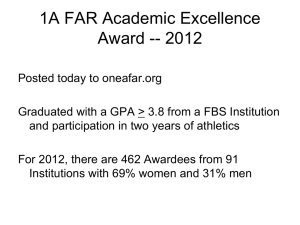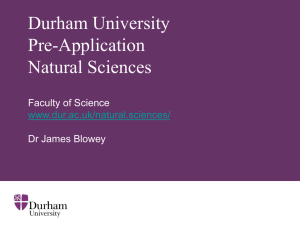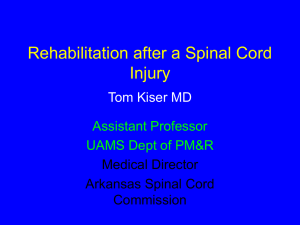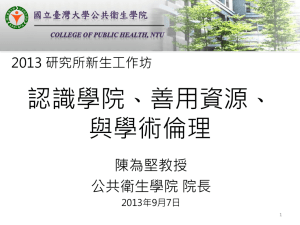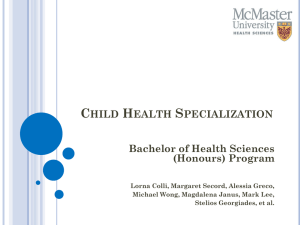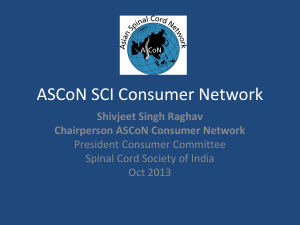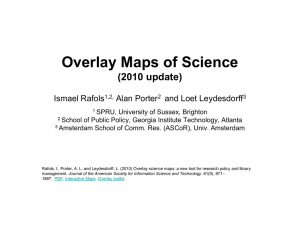Life Sciences Independent Study & Research Practicum Guide
advertisement
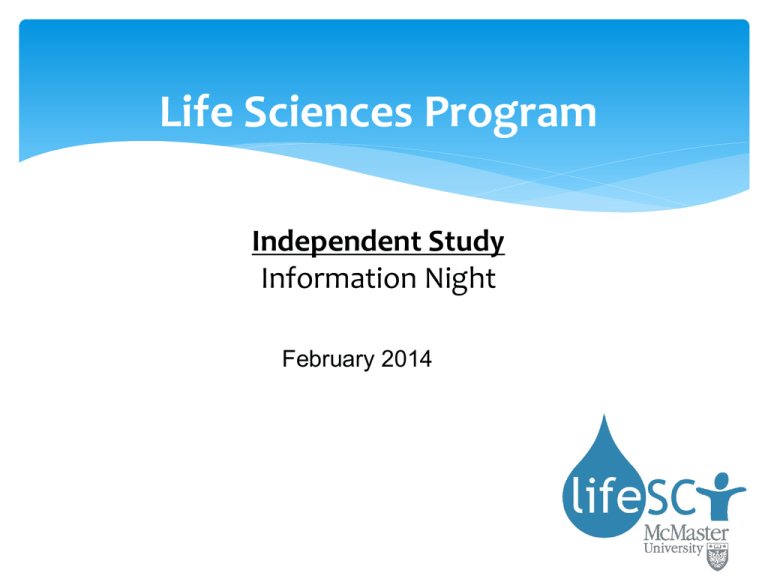
Life Sciences Program Independent Study Information Night February 2014 What is a Research Practicum ? LIFE SCI 3RP3 Provides students an opportunity to explore potential research projects while volunteering in the laboratory or clinic of a faculty member in Science or Health Sciences Students will complete 60 hours of practicum work in the laboratory or clinic over one term Students will be required to complete a research proposal as a final graded deliverable for the course 3RP3 - Prerequisites Credit or registration in SCIENCE 2C00 Registration in Level III or above of Life Sciences Permission from Research Supervisor Director of Life Sciences (or delegate) Completion of the required application form 3RP3 - Course Restrictions LIFE SCI 3RP3 is not open to students with credit or registration in the following courses at the University Department- or program-based applied placement Independent Study Research Seminar Internship Practicum course Students may not take LIFE SCI 3RP3 and an Independent Study Course concurrently LIFE SCI 3RP3 must precede an Independent Study Course but is not a required prerequisite for LIFE SCI 4A03, 4B06, 4C09 What is an Independent Study? LIFE SCI 4A03, 4B06, 4C09 1- or 2-term course with one supervisor Conduct Independent research or investigation Formulate a scientific hypothesis Design and conduct research to support or refute hypothesis Learn and utilize research techniques Apply statistics Present results and analyses in a written thesis Oral or poster presentation 4A03, 4B06, 4C09 - Prerequisites Registration in Level IV of Honours Life Sciences Requires permission of the supervising faculty member and course coordinator LIFE SCI 4A03 LIFE SCI 4B06 LIFE SCI 4C09 CA of 7.0 CA of 8.5 4A03/4B06/4C09 – Time Commitment LIFE SCI 4A03: LIFE SCI 4B06: LIFE SCI 4C09: 6-9 hours/week over 1 term 9-12 hours/week over 2 terms 15-18 hours/week over 2 terms How are you evaluated? 4A03 The marking scheme for the one term independent study course is as follows. Literature Review Lab/Clinic/Field/Computer Formal Presentation Final Research Proposal Report 20% 30% 20% 30% How are you evaluated? 4B06/4C09 The marking scheme for project and thesis courses are as follows. Research Proposal/Lit Review Mid-year assessment Written final report or thesis Lab/Clinic/Field/Computer Final presentation in lab meeting, Ontario 10% 15% 25% 30% Biology Day or Life Sci Interdisciplinary Research Symposium 20% LS 4A/B/C are optional except for students in Origins specialization Must take ORIGINS 4A09 Supervision • These courses require the supervision of a professor from the Faculty of Science or Faculty of Health Sciences. • It is YOUR responsibility to find a supervising faculty member for your project • Further Supervisor search tips are available on the Life Sciences website. Finding a suitable research supervisor in Faculty of Science Use the following links to Department and Faculty websites to find potential Academic supervisors: DEPARTMENT DEPARTMENT FACULTY WEBSITE Biochemistry and Biomedical Sciences http://www.fhs.mcmaster.ca/biochem/people_faculty.html Biology http://www.biology.mcmaster.ca/faculty Chemistry and Chemical Biology http://www.chemistry.mcmaster.ca/research-home Geography and Earth Sciences (including Environmental Sciences) http://www.science.mcmaster.ca/geo/faculty/faculty.html Kinesiology http://www.science.mcmaster.ca/kinesiology/people/faculty.html Mathematics and Statistics http://www.math.mcmaster.ca/people/index.php?position_selected=2 Med Physics & Applied Rad Sci http://www.science.mcmaster.ca/medphys/people.html Physics & Astronomy (&Biophysics) http://www.physics.mcmaster.ca/?menu=18#page=All Psychology, Neuroscience & Behaviour http://www.science.mcmaster.ca/pnb/people.html Finding a suitable research supervisor in Faculty of Health Science There are too many departments in the Faculty of Health Sciences to list here: The following link is a good starting place: http://fhs.mcmaster.ca/main/schools_and_departments.html Explore the Departments that interest you and look for potential faculty members to contact for an interview Then what? Contact the professor! • Send an email inquiry, introducing yourself, indicating your interest—be specific about what research you would like to do; explain that you are looking for a supervisor for a project or a thesis, and would like an appointment to discuss potential research topics • If you have taken a course with the professor, let him/her know that, and if you have a list of courses or an unofficial transcript, include that as an attachment • You want to impress the professor and sell yourself as being an asset to the research group • Do not simply say “Are you taking on any more students?” • Do this all relatively briefly When should you do this? • If you are in Level 2, start looking for a supervisor at the beginning of Level 3 (October and November) • Offer to complete a Life Sci 3RP3 (Life Sciences Research Practicum) with the professor in the spring or summer term or in Level 3 so you can learn more about their research. Who will you really be working with? • In many instances, the day-to-day training will be with postdocs or graduate students in the lab • You may not meet with your supervisor more than once or twice a month or once weekly during lab meetings • Sometimes, however, you may work very closely with the professor---it all depends on your circumstances • SO ASK YOUR potential supervisor about this BEFORE you start the project if this is important to you. Forum for presenting your results: Ontario Biology Day Conference held annually in March and rotates around 12 universities in the province. Lab Meetings Conferences Forum for presenting your results: Life Sciences Interdisciplinary Research Symposium (LS-IRS) Run by the Life Sciences Program for HLS 2014 Event: April 1 Ewart Angus, HSC-1A area All welcome to attend oral and poster presentations of current students. Application deadlines: LIFE SCI 3RP3 30 days prior to the start of the term in which the course takes place LIFE SCI 4A03 Fall Term 1: July 1 Winter Term 2: November 1 Spring/Summer: March 1 LIFE SCI 4B06/4C09 Spring/Summer: March 1 Fall/Winter: March 31 Note: these deadlines are for submission of forms, but you are strongly encouraged to contact a Faculty member as soon as possible to arrange supervision. Examples of Past Projects Tooth Development in Sea Urchins. 3 unit project Department of Biology Newborn genetic screening. 6 unit project Biochemical Genetics Program Examples of Past Projects Molecular markers of heart disease. 3 unit project Department of Pathology & Molecular Medicine Cell cycle regulation in flies. 9 unit project Department of Biology Examples of Past Projects Bone density and maternal health Biochemistry and Health Sciences Basic Research (Lab Bench). -drug discovery Group projects with Dr. Dej and Dr. Gupta (Biology) Nematode phylogenies These projects give students the opportunity to work independently while still acquiring the skill of coming back together in a group to aggregate and analyze the collected data. Field with Dr. Chow-Fraser Field opportunity • In partnership with Hamilton Naturalist Club, determine the ecological status of endangered species such as the flowering dogwood and American chestnut in Spooky Hollow • Conduct long-term monitoring of streams and wetlands in Hamilton region or in the Bruce Peninsula More information: www.science.mcmaster.ca/lifesciences/
